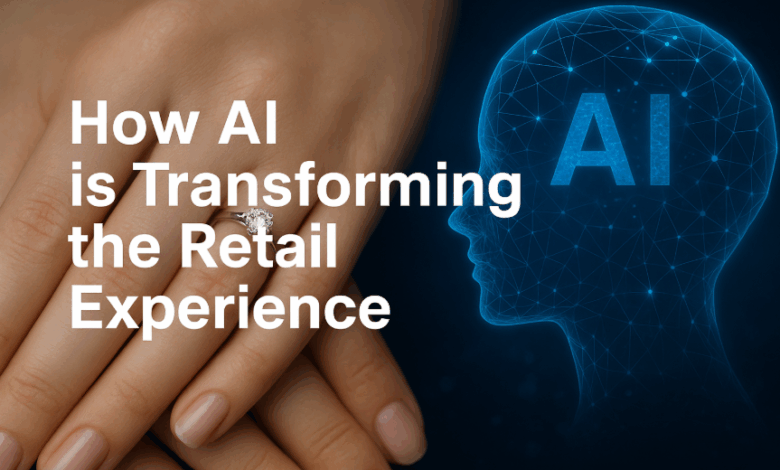
The artificial intelligence has emerged as one of the most revolutionary elements in the retail sector. A transactional relationship between consumers and brands has now become personalized, predictive and highly immersive experience with the power of data-driven insights. Starting with e-commerce giants up to luxury retailers, AI technologies are transforming the manner in which people shop, discover products, and even fantasize about their next possible purchases.
Personalization at Scale
Probably one of the most important contributions of AI to the retail industry is the capability of providing a level of personalization at scale. Old fashioned techniques of product recommendation were restricted to general categories or bestsellers. At this point, sophisticated algorithms use browsing history, previous purchases and even minute interactions on the websites to develop personal shopping experiences to each customer.
To illustrate, when a customer is looking online to buy jewelry, AI can be used to reduce options not only by type of product, but also by deduced interests like style, price category, or even by season. The consumer does not have to scroll endlessly but rather he sees a well-edited set that looks hand selected. This not only wastes less time but also makes customers more satisfied and raises the conversion rates.
Improving the Luxury Shopping Experiences.
Luxury retail has been one of the biggest beneficiaries of AI which has made the shopping experience both desirable and affordable. Luxury brands are extremely dependent on customer perception and the tools based on AI are helping them to preserve exclusivity and enhance accessibility. Virtual try-ons, such as those used by computer vision and augmented reality, are another example of what lets a customer see how a product would look on them before purchasing it.
Suppose a person is thinking of an ornament. Rather than going to several outlets, AI-based visualization tools can place the product on the hand of the shopper with the help of their smartphone. A brand such as Swarovski with its crystals being cut with precision can display detailed structure of objects in 3D. To those shopping engagement rings or wedding rings, AI facilitates a more personal buying process, which can lessen uncertainties and introduce security to a purchase of a product that has such emotional resonance.
Predictive Retail: What Comes Before It.
In addition to personalization, AI is fueling predictive retailing- guessing what the customer wants even before the customer proactively seeks a product. The large volumes of consumer data fed into machine learning models are able to determine patterns that may indicate future intent.
As an illustration, a person, who has just visited a wedding venues or bridal fashion websites online, may get hints at product suggestion, implying accessories or jewelry, powered by AI. The retailers who are taking advantage of this predictive intelligence, can be one step ahead of the rest and present solutions at the time the customer most needs them.
Emotional Connection Through AI
The second potential of AI in retail that can be regarded as underestimated is the ability to enhance the emotional bond. The purchase of luxury goods, in particular jewelry, is not a very rational decision. It can be a symbol of love, devotion, or self-identification. AI has the power to make this emotional experience more interactive by providing the ability to tell the story.
Via natural language processing, virtual assistants can take customers through the legacy of a brand, the craftsmanship that goes into every product, or even propose custom engravings to a wedding ring. With AI, a Swarovski shopping experience could incorporate narrative about the origins of the crystal or Swarovski production methods to establish a more meaningful connection between the product and the customer.
Omnichannel Integration and AI
The sphere of modern retail is no longer limited to either physical or virtual space- it is omnichannel. AI will guarantee a smooth shopping experience through these mediums. Regardless of whether a consumer engages with a chatbot on a web site, gets a custom email, or goes to a brick and mortar store, AI links the dots to offer continuity.
An example is a customer who has shortlisted wedding rings online and an in-store AI kiosk may remind them of the choices made when they visit a boutique. This is not only making shopping convenient but also consistent in the shopping experience.
Ethical Considerations in AI-Powered Retail
Although the advantages of AI in retail cannot be underestimated, there are ethical issues, as well. Gathering and processing of customer data leaves the concern of privacy and consent. Transparency is also essential–they should understand how they are using their data, and they should be confident that they are keeping it safe.
Also, with AI machines playing an increasing role in shaping buying decisions, retailers should make sure that they are empowering customers instead of controlling them. One of the most necessary steps in ensuring consumer confidence is giving choice, providing clear information and control on personal data.
Future Outlook The Future of AI in Retail.
Predictive analytics combined with emotional intelligence will probably be the next step in AIs in retail. The more natural language processing is advanced, the more the AI systems will know not only what the customers desire but also why. This may include not only a product but an experience, which appeals to the values, lifestyle, and aspirations of the person.
The luxury retail will be in the forefront in implementing these innovations especially in their goods like jewelry and accessories. The skill to merge tech accuracy with the feeling will make the victors of the AI-enhanced retail world when customers are after such personalized purchases as wedding rings.
Final Thoughts
AI is no longer a back office device in retail-AI has become the engine of a bespoken, forecasting and emotionally immersive shopping experience. Being used in mainstream fashion and in luxury jewelry brands such as Swarovski, AI is assisting companies to build journeys that are more intuitive, inspiring, and customer-centric.
However, the question of the future is not whether AI will still influence retail–it already has–but how brands can utilize it in a responsible way to build trust, build connections and create experiences that extend well beyond the transaction itself.




